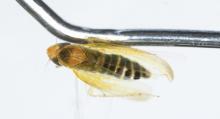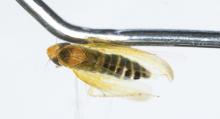CALEXICO, Calif. – U.S. Customs and Border Protection agriculture specialists at the Calexico East port of entry commercial facility intercepted a “First-in-Nation” pest, a minute insect commonly known as a “leafhopper.”
The incident occurred on July 26, when a shipment of celery and fresh peppers arrived at the Calexico East Cargo Facility. CBP officers referred the shipment for further agricultural inspection. During an intensive inspection, a live adult Hemiptera specimen, tentatively identified as Cicadellidae, was found by agriculture specialists in the shipment of celery. The specimen was submitted to local U.S. Department of Agriculture (USDA) Animal and Plant Health Inspection Service (APHIS) Plant Protection and Quarantine (PPQ) and was then referred to a specialist for identification.
On July 29, the USDA APHIS PPQ specialist confirmed the final identification as Kunzeana versicolora (Cicadellidae), an actionable pest. Per local USDA APHIS PPQ, the Kunzeana versicolora qualifies as “First-in-Nation” interception. The Cicadellidae are commonly known as leafhoppers. These minute insects are plant feeders that suck plant sap from grass, trees, and shrubs. Leafhopper feeding causes leaves to develop pale specks. Some leafhopper species transmit plant pathogens that cause plant disease.
“Our CBP agriculture specialists are always on the lookout for those miniature threats that can harm our economy,” said Anne Maricich, CBP Acting Director of Field Operations in San Diego. “Their perseverance and commitment are remarkable, and our country is the one that benefits the most from it.”
The truck and shipment were returned to Mexico by CBP as a precautionary measure.
CBP officers and agriculture specialists conduct examinations in the passenger and commercial environments to prevent harmful pests and diseases from becoming established in the U.S. For more information about CBP’s agriculture mission, click on the following link.

